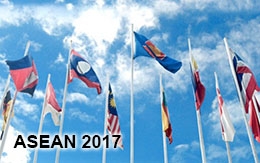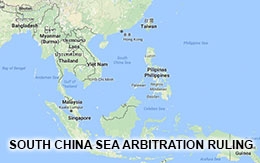Coercive tactics: China, Turkey and International Law
Energy exploration by China and Turkey within the national waters of other nations is contrary to international law – it is upon the international community to steer recalcitrant states towards obedience.

The first incident concerns the unauthorized conduct of seismic exploration surveys by the Chinese Haiyang Dizhi 8 in the Vanguard Bank, an area well within Vietnam’s EEZ and far outside any potential Chinese maritime claims. China’s seismic survey vessel was accompanied by at least four China Coast Guard vessels, including a 12,000-tonne Haijing 3901 and a large number of anti-aircraft vessels, according to reports. The second incident concerns the conduct of drilling operations by Turkey in a maritime area well within Cyprus’ Exclusive Economic Zone (EEZ). Turkey’s drilling vessel was escorted by the Turkish Naval Forces Command, both on the surface and underwater.
The majority of members of the international community, including the European Union, have largely sided with Vietnam and Cyprus in each case - citing the importance of acting in accordance with international law. The US State Department said in a statement on 20 July 2019: “The United States firmly opposes coercion and intimidation by any claimant to assert its territorial or maritime claims…including the use of maritime militia to intimidate, coerce, and threaten other nations, undermine the peace and security of the region”.The choice of this particular language, particularly the use of the word ‘coercive’ to describe the actions in question is important and may carry far-reaching implications in international law. Coercion through the application of military means is amongst the key criteria by which the actions of a state can be deemed to be in violation of the universally established non-use of force principle, as embodied in Article 2(4) of the United Nations (UN) Charter which provides that: “All Members shall refrain in their international relations from the threat or use of force against the territorial integrity or political independence of any state…” The obligation in Article 2(4) supplements Article 2(3) of the UN Charter requires states to settle their disputes through peaceful means. The same obligation is also corollary to the principle of non-intervention which, as defined by the International Court of Justice (ICJ) in Nicaragua v United States, “involves the right of every sovereign State to conduct its affairs without outside interference.” Under this principle, a state is prohibited from interfering, either directly or indirectly, in the internal or external affairs of another state, whether through military, subversive, economic, or even diplomatic means. The ICJ noted in the same case that an intervention which uses military means would be wrongful in light of both principles of non-use of force and non-intervention. Thus, while coercion through military means (e.g. deployment of military forces in the territory of another state and threats of use of force against that state to refrain from pursuing its energy policy agenda; see report here and briefing by Prof Thayer here) would engage both the prohibition on the use of force and the principle of non-intervention; non-forcible coercive conduct (e.g. mere economic coercion) only runs counter to the latter.
Whilst military coercion in and of itself is not specifically provided for in Article 2(4), there are good grounds to argue that an unlawful use of force does not necessarily have to be violent or lethal; the deployment of military force aimed at coercing and deterring other claimant parties from interfering with control over that territory would also be sufficient for a breach of the prohibition to be upheld. This is largely because, even in situations where no shots are fired and no damage is inflicted to people or property, the deployment of military forces in the territory of another state is likely create a fait accompli that coerces that party into accepting the new situation on the ground and, as Mikanagi explains, “makes it materially impossible for other claimants to restore the status quo ante without risking human injury or damage to property”.This position, and particularly the focus on coercion through military deployment, appears to be evident in the Costa Rica v Nicaragua case. Costa Rica asked the ICJ to find that by deploying military forces in the disputed territory Nicaragua breached the prohibition of the threat or use of force under Article 2(4) of the UN Charter. The ICJ said: “The fact that Nicaragua considered that its activities were taking place on its own territory does not exclude the possibility of characterizing them as an unlawful use of force.” Although the ICJ avoided an explicit ruling on whether Nicaragua had actually breached Article 2(4), in his separate opinion, Judge Robinson considered that “non-violent use of force” is not exempted from the prohibition according to the ICJ’s jurisprudence: “no shots need be fired, no heavy armaments need be used and certainly no one need be killed before a State can be said to have violated the prohibition”. In this case, the combination of the “prolonged presence” of Nicaragua’s military camps and personnel, its refusal to withdraw its troops from the disputed territory and the “pointing of weapons” at the Costa Rican aircraft, clearly signalled Nicaragua’s “coercive purpose”, namely its “readiness to apply force, whenever Nicaragua considered it necessary” as a means “to challenge Costa Rica’s sovereign rights”. According to Judge Robinson, Nicaragua’s conduct warranted a finding of use of force in breach of Article 2(4) of the UN Charter.
As a matter of law, one of the core features of the prohibition under Article 2(4) is the “application of military force as a means of coercion”. Coercion aims at “forcing the will of another state” to accept a new status quo with the use of military means, according to use of force expert Prof Roscini. Whether an act has a coercive purpose, it is to be inferred from the circumstances depending on the scale, prolonged character and nature of military deployment.Under international law, Vietnam and Cyprus exercise exclusive sovereign rights over the natural resources located within their EEZ and continental shelf. By virtue of these sovereign rights, they can authorize and regulate the conduct of geophysical surveys as well as construct, operate and use installations and any other structures necessary for the exploration and exploitation of their natural resources in order to determine whether there is sufficient quantity of hydrocarbons or other mineral resources in place and, based on these findings, design their national energy policy agenda, free from any foreign interference. By resorting to means of military nature, China and Turkey have steadily sought in each of these cases, to prevent their opponents from pursuing their legitimate energy policy agendas. Displaying a closely-mirrored modus operandi, Beijing and Ankara have taken considerable steps to place the maritime areas in question under their control and enforce their legal positions by: a) projecting excessive maritime claims based on arbitrary legal grounds; b) steadily militarizing the maritime areas in question; c) restricting other states’ freedoms, particularly those of their neighbours and d) creating a fait accompli which is very difficult to undo given that neither Vietnam nor Cyprus are able to militarily challenge their opponents in each case.
Indeed, by camouflaging intimidation and coercion as ‘exercise of legitimate rights’, China and Turkey present their opponents in each case with a Hobson's choice: endure the new status quo or face a costly war with a powerful state, strategically positioned in the region. Both China and Turkey have successfully made use of this coercive tactic in the past, for example, China’s continuous militarization of disputed territorial features and surrounding waters causing its opponents to admit the loss of territorial control and Turkey’s constant threats towards private-sector petroleum companies operating off Cyprus causing them to postpone operations.Collective action is possible and necessary
The consequence of determining that the constant acts of coercion through military deployment by China and Turkey in the waters of other states violate Article 2(4) of the UN Charter, which is that it would be a breach of an erga omnes norm (i.e. one owed to the international community as a whole) is that third states may invoke China’s and Turkey’s international responsibility. More importantly, such a violation would then permit third-party countermeasures as a matter of customary international law. This would mean that third states, other than the injured states, can seek to bring the breach to an end and are entitled to take non-forcible countermeasures against the transgressors, just as if they were directly injured by that violation. There are various examples of states responding to violations of obligations erga omnes by resorting to non-forcible countermeasures: the sanctions imposed by the United States against the Soviet Union because they regarded the latter as responsible for a threat to international peace by deploying its troops along the Polish border in 1981; the sanctions imposed by the European Community against Argentina following its forcible take-over of the Falkland Islands in 1982, which was condemned as a “breach of the peace” by the UN Security Council; and the sanctions imposed by the European Union and the United States against Russia for annexing Crimea and intervening in Eastern Ukraine in 2014. While these sanctions were in response to acts of aggression, the prohibition of which has been recognized as jus cogens, it could be argued that the prohibition of the use of force is itself an erga omnes norm even if that prohibition standing on its own, as distinct from the prohibition of aggression, is not a jus cogens norm. Crucially - and perhaps more pertinently to the incidents reviewed in the present paper - after several warnings to Turkey to cease its provocative actions, the European Union has decided to impose a series of targeted, yet limited, sanctions on Turkey for unlawfully sending its military and commencing drilling operations within Cyprus’ EEZ, though it made no explicit reference to the UN Charter.
No state wishes to be coerced into silence and inactivity over its sovereign affairs. The mere possibility provokes strong emotions, especially when the use of armed force is used or threatened to be used. The universally-accepted provisions of the UN Charter impose affirmative legal obligations upon all nations to refrain from the threat or the use of force, or from any other means of military coercion for the settlement of their differences, to refrain from interfering with the internal affairs of other nations and to have recourse at all times to peaceful means of dispute resolution. Both the obligations to follow the dispute settlement procedures under the UN Charter and UNCLOS and the substantive obligations incumbent upon the international community to steer recalcitrant states towards obedience are equally important. That is why the international community needs to explicitly qualify the conduct of China and Turkey as a direct violation of the UN Charter and “make a clear case against coercion”, either by calling upon the Security Council to approve collective non-forcible countermeasures or by petitioning the UN General Assembly to request an advisory opinion on the legality and legal consequences under international law of China’s and Turkey’s conduct by the ICJ, or indeed both. Whilst an advisory opinion has no binding force on the parties, it will nonetheless provide a valuable authoritative statement of the law; one which will prompt the international community to take meaningful action to act on the advisory opinion and demand recalcitrant states to fall into line.Dr. Constantinos Yiallourides (@ConstantinYiall) is the Arthur Watts Research Fellow on the International Law of Territorial Disputes at the British Institute of International and Comparative Law (BIICL) and Visiting Scholar in International Law at the University of Tokyo, Japan. He is the principal author of the research report, “The Use of Force in relation to Sovereignty Disputes over Land Territory” (BIICL 2018) and the monograph, “Maritime Disputes and International Law: Disputed Waters and Seabed Resources in Asia and Europe” (Routledge 2019).
Opinions in the article are the author’s own.
Click here for pdf file










